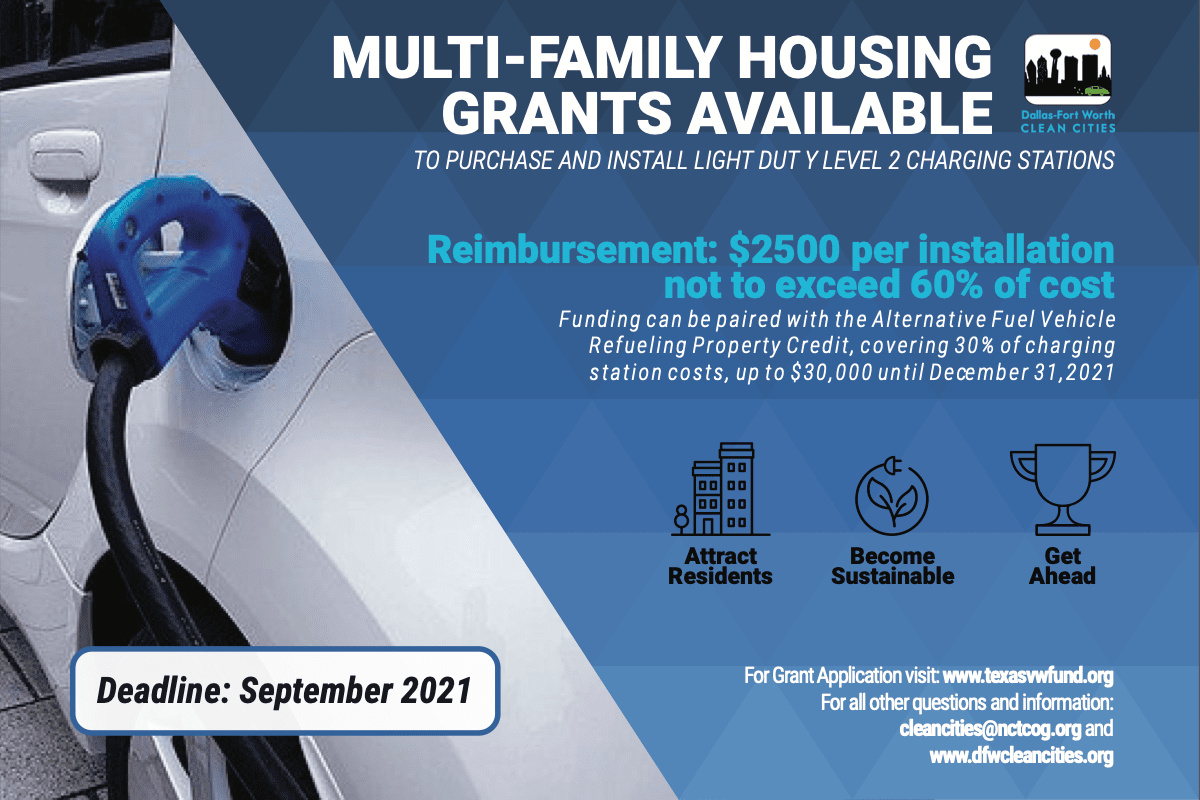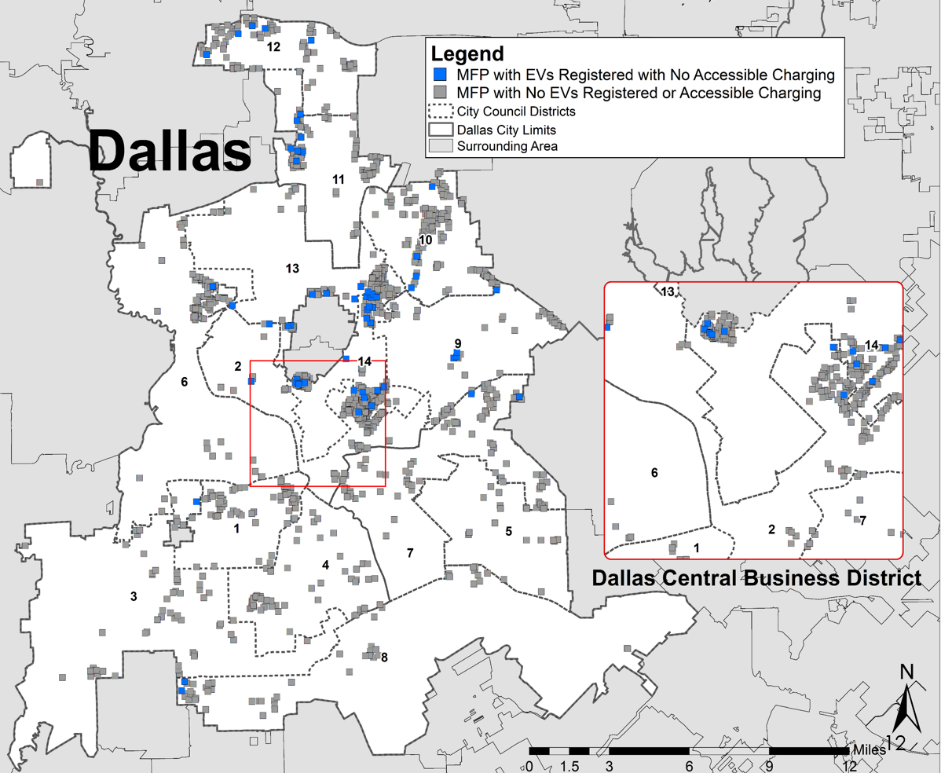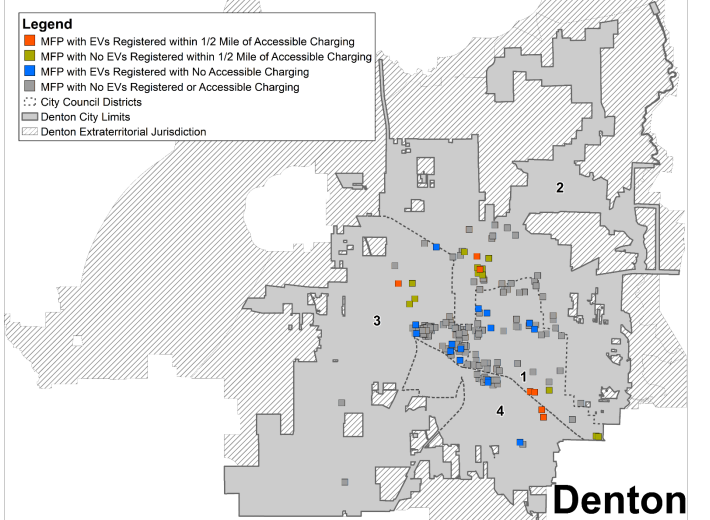March 27, 2023
Dallas Prioritizes Equitable Access for EV Charging in Multifamily Housing
The city of Dallas and Dallas-Fort Worth Clean Cities (DFWCC) are working together to bring electric vehicle (EV) charging to all drivers, including people living in underserved communities and multifamily housing—also called multi-unit dwellings. This joint effort aims to improve equitable access to sustainable and affordable transportation options by increasing the number of EV charging stations in underserved areas.
Community Engagement: Driving Expansion
The city partnered with the Apartment Association of Greater Dallas to promote EV charging to multifamily housing building owners through a magazine article and a webinar.
In early 2022, city government representatives attended the Annual Apartment Association of Greater Dallas Trade Show and engaged with hundreds of northern Texas property owners and management companies to discuss installing EV charging stations as an amenity for their properties.
The city also included EV content in a city-wide recycling outreach campaign. The project team was able to add information about EVs to an existing mailer at no additional cost by thinking creatively about what materials were already being distributed to multifamily housing building owners.
Three major points included in EV charging promotional materials: (1) the lower cost of operating EVs compared to conventional counterparts, (2) the need for improved air quality and legal implications associated with being out of ozone attainment, and (3) the availability of EV charging funding through the TxVEMP program.
Setting the Stage
The Dallas-Fort Worth area is an ozone nonattainment area under the air quality standards established through the federal Clean Air Act. In May 2020, the city released the first Dallas Comprehensive Environmental and Climate Action Plan (CECAP), which set eight goals and 97 actions the city can take to help reach attainment. Equity and inclusion are key components of the plan.
Specifically, the plan sets a goal to install 1,500 EV charging ports to support 39,000 vehicles throughout the city by 2030. Pharr Andrews, senior climate coordinator for the city of Dallas, noted that city planners recognized the importance of expanding EV charging to make it accessible to city residents living in multifamily housing as almost 50% of the people living in Dallas-Fort Worth live in multifamily housing.
“Equity was at the center of CECAP,” Andrews said. “We acknowledged that not everyone is affected by climate change at the same rate, and we put extra energy into vulnerable populations.”
Capitalizing on Partnerships
To reach their EV charging station goals and equity initiatives, the city partnered with DFWCC to analyze multifamily housing locations where EV charging stations could be installed. In addition to DFWCC, the city also worked closely with the Texas Housing Department to introduce EV charging in state-owned multifamily housing and partnered with the Apartment Association of Greater Dallas to help promote EV charging to multifamily housing building owners .
Analyzing the Data
DFWCC used Geographic Information Systems (GIS) to analyze publicly and privately available data, including EV registrations, income, and multifamily housing locations, as well as the North Central Texas Council of Governments Environmental Justice (EJ) index. The EJ index uses regional averages of socioeconomic indicators to identify areas of the city that are likely underserved by investment and overburdened by pollution. The analysis resulted in density maps that identified locations with low accessibility to EV charging infrastructure and many multifamily housing units.
Preliminary results of the analysis show that only 8% of multifamily housing locations in the Dallas area have access to charging stations and only 11% have residents with registered EVs.
“The tendency of EV charging infrastructure to follow EV registration has led to a historic lack of EV charging in EJ communities and areas with a high abundance of multifamily housing,” said Bailey Muller, DFWCC. “However, it is important to understand that not all multifamily housing buildings are in EJ communities.”
For this reason, it was important to conduct a comprehensive geographic analysis to understand where the real need was.
Muller and her team found that, citywide, 54% of all multifamily housing locations do not have access to EV charging. When looking at EJ areas specifically, however, the number jumps up to 67% of multifamily housing locations without nearby access to EV charging. The city is using this information to focus its attention and investments moving forward. The need to increase EV infrastructure was also reflected by residents who shared their concerns during public hearings held by city representatives in each council district.
Figure 2. EV ownership in multifamily housing without charging nearby. Citywide, 54% of EV owners living in multifamily housing did not have access to charging within a half-mile of their residence.
Dallas-Fort Worth started building out its EV infrastructure with grant funding from the Texas Commission on Environmental Quality’s (TCEQ) Texas Volkswagen Environmental Mitigation Program (TxVEMP) Level 2 Charging Equipment for Light-Duty Zero Emission Vehicles program. The city submitted seven applications to fund EV chargers, with site selection based on a geographic gap analysis conducted by DFWCC that identified city facilities that were suitable for charging and aligned with equity goals. They were awarded $87,500 for 35 charging stations at eight locations throughout Dallas, with a mix of public and private charging. Andrews’ team is using the analysis conducted by DFWCC to start site planning in council districts with low EV charging infrastructure availability.
“We are excited about the work we’ve done in multifamily housing,” Andrews said. “And we are interested in expanding efforts and exploring options to help electrify workplace and public locations as well.”
Sharing the Success
Figure 3. Multifamily Properties in the city of Denton with and without accessible charging stations or registered EVs
DFWCC worked with the city to develop a sound methodology for conducting an EV charging gap analysis and was eager to apply this success in other parts of the state. One of the largest challenges with the GIS analysis was obtaining reliable data on private charging stations and EV registrations. DFWCC obtained EV registration data from the Texas Department of Motor Vehicles and analyzed the data using VIN decoders and manual queries to determine what type of vehicle was registered.
In January 2022, DFWCC successfully replicated their GIS analysis methodology for the city of Denton. The analysis showed that 89% of residents in multifamily housing lacked access to EV charging, a higher rate than Dallas overall. After the successful replication, DFWCC developed a “Multi-Family EV Charging Accessibility Replication Guide” for the Clean Cities Coalition Network so others could use their methodology in communities across the country. To learn more about the methodologies and case studies, visit the DFWCC EV Charging Multi-Family Housing page.


